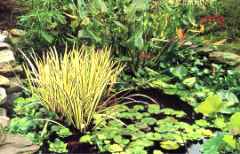 The
Dreaded Algae Bloom In Water Gardens
The
Dreaded Algae Bloom In Water Gardens
 The
Dreaded Algae Bloom In Water Gardens
The
Dreaded Algae Bloom In Water Gardens
Our nursery staff is inundated with complaints of “pea green” water at this point in time. This is a perennial problem for the water gardener. Lets face it - “algae happens”. Be it the new or established water garden, colder water temperatures of winter are not conducive to algae bloom. Like the well rested distance runner, the algae views spring an opportunity to win a major competition because it is fresh, rested, and has opportunity. The naturally occurring nutrients are present in the water and the algae knows very well that it is the quickest competitor “off of the blocks“. The algae will win in the short run, but can it go the distance? This depends on the competition.
Addition of submerged plant material such as floating anacharis provides surface area of underwater foliage to utilize nutrients in the water. As these plants feed on the nutrients they deplete the food source for algae.
Higher temperatures and light also enhance algae. Addition of floating plants such as water hyacinths and water lettuce not only utilize nitrates (nutrients not unlike those found in a box of Miracle-Gro) but they also cover the surface of the pond, reducing the amount of sunlight penetration in the water body. Such plants may not be legal for use in more Southern states, as they can be invasive if not extinguished by freezing temperatures.
Additives such as “Accu-Clear” shade the water, thus reducing sunlight penetration. They also coagulate dying algae particles which have run the course of their life cycles. Such coagulation causes the dead algae particles to fall to the bottom of the pond, rendering a greater clarity to the water body. Other bacterial additives biologically break down the sludge like dead algae, which has settled to the floor of the pond.
Mechanical filters, driven by the flow of water from electric re-circulating pumps, trap dead algae for physical removal. Most filters are made from foam or volcanic stone, both of which are quite porous. These substances harbor naturally occurring bacteria which break down the dead algae, much like the bacterial additives. As a rule, filters are an absolute must.
The newest and most expensive additive to algae control is very effective. This is a UV (ultra violet) light, which is plugged into the circuit of he re-circulating pump. The UV light bakes the algae into oblivion. I consider this device as dialysis of the pond water. UV filters generally range from $100 to $200 in cost. In larger ponds, they are often the keys to success. With regard to such expenditure, I say, “You can run, but you cannot hide.”
Fish can usually live off of the naturally occurring nutrients in the water, such as plant life and insect larvae. For this reason, mosquitoes are generally not a problem in the water garden. We feed our fish for our own gratification. The nutrient-laden gasses emitted from well fed fish encourage algae growth. The food, which is not consumed, is also rich in nutrients. Only feed your fish an amount of food which will be consumed within 3 or 4 minutes, and do this only once daily. Anything beyond this simply feeds the algae.
Like the turfgrass grower, one needs to relax and not work too hard, as problems can often be self-inflicted due to too much effort. This column may be a bit dry and humorless, but it is important to those fighting the “algae dragon”.
Speaking of “dry and humorless”, I will close with an unrelated anecdote. My organic chemistry teacher who was a straightforward person whom we referred to as the nicest “Martian” we ever met. Our first lab exercise was “Proper Methods of Approaching A Chemical Compound”. We were presented with 36 open beakers of clear liquid. Upon command, we were instructed to waft the vapors from the first beaker...chocolate! The second beaker was mint! And so forth. By the fifth beaker, we looked like Richard Pryor snorting cocaine (without a lighter). On the sixth beaker we encountered Butyric Acid - at which point two students literally “tossed their cookies”. It was a nasty smell that I cannot describe in words. The professor never cracked a smile but he made his point. Until next week.
Andy Lynn